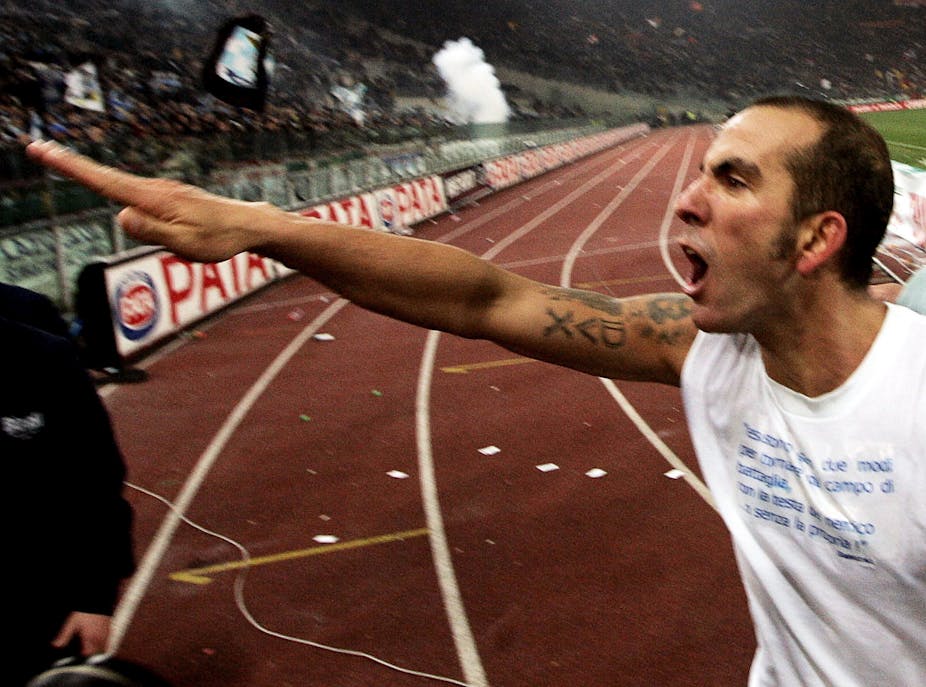The resignation of senior British political figure David Miliband as non-executive director and vice-chairman of English soccer club Sunderland A.F.C. - in protest at Paolo Di Canio’s appointment as the Premier League club’s new manager - has engulfed Di Canio in a controversy that he and his new employers are struggling to contain.
The storm surrounds events back in 2005. While playing for Rome’s Lazio club, Di Canio twice hailed the team’s fans with a Nazi salute. Then, he defended his actions by claiming to be a “fascist, not a racist”. To the puzzlement of Di Canio, and Sunderland, these events are the subject of renewed public scrutiny, despite the fact that he was disciplined for them eight years ago.
In a tetchy press conference stand-off with reporters last night, Di Canio repeated that he is not a racist. He also insisted that he is not a political person. When reporters would not leave the fascism issue be, rattled PR staff ended proceedings. Two questions follow: why are people so upset now, and what would another renunciation achieve?
Folks are upset because - unlike Di Canio - many soccer supporters are political people. Yesterday, the Durham Miners Association asked for its banner to be removed from Sunderland’s stadium. Like Miliband, the organisation stated its love of the club is outweighed by its historic commitment to fight fascism wherever it arises.
Elsewhere, Di Canio stirs unease at a lack of progress on racism in soccer. Football Against Racism in Europe’s Piara Power has called on Di Canio to clarify his views. Power thinks Di Canio’s statements so far aren’t enough, given known affinities between fascism and racism: “fascist”, Power said, “is a political label that comes across with all sorts of dangerous ideas and ideals and that is the concern for us”.
Di Canio’s past matters because of an ominous present. Premier League stars Luiz Suarez and John Terry have been accused of racial vilification in recent seasons, while last week Rio Ferdinand was the subject of abusive chanting from England fans over the Terry case (which involved his brother, Anton). Ferdinand tweeted “racism is not banter, and from your own fans. WOW”.
Ferdinand isn’t the only worried star. Last month, AC Milan’s Ghanaian-born Kevin-Prince Boateng addressed the UN on the need to take a tougher stand on racial abuse in soccer. Boateng could talk the talk because he walked the walk: he left the pitch during a game in January in protest at racist chanting from the crowd.
Many supporters share these concerns. Last month, the Journal of Ethnic and Migration Studies released results from a survey of 2500 British soccer fans on their experiences with racism. The survey, by Jamie Cleland and Ellis Cashmore, found that half of the sample still encountered it during matches.
The study also found disgruntlement at a lack of effective official action against racist incidents, and a fear that social media is exacerbating things: abuse can now be delivered right into players’ hands.

That’s why Di Canio is being asked about 2005 again. In light of recent events, letting his appointment proceed without querying past political statements attributed to him smacks of the indifference that has led the game to where it is.
But the operative word here is indifference. Di Canio’s actual beliefs might be less important than they first appear, because avowed, dyed-in-the-wool racists aren’t the only challenge.
Asked about his “Roman” salute, Di Canio cast the gesture as a tribute to fellow Lazio fans in whose ranks he once stood. Political overtones were incidental to the particular meaning of that act delivered by one player to a certain set of people at the stadium.
This sort of argument is typical of the “casual racism” defence that Cleland and Cashmore also found among their respondents. Condemnatory as fans were about racism in principle, many of the sample - especially those who were “white, male and under 29” - defended “occasional outbursts” as inevitable, given that racism is a societal issue. In other words, casual racism isn’t the real thing. By the same logic, an off-the-cuff Nazi salute doesn’t necessarily signify considered political convictions.
According to the survey, it’s the culture that tolerates casual racism that intimidates those minded to confront racists in action. Often, the idiot doing the “monkey chant” is less imposing than other fans and officials who just want to keep a lid on things, and regulatory bodies who’d rather have players carry on, regardless.
In the end, no-one really turns a hair until someone like Kevin-Prince Boateng says “enough” and leaves the pitch. Actions like that threaten to derail soccer’s status as a lucrative global media spectacle. That does more than another press conference.
Until racism substantially threatens soccer showbiz, change will be slow.

